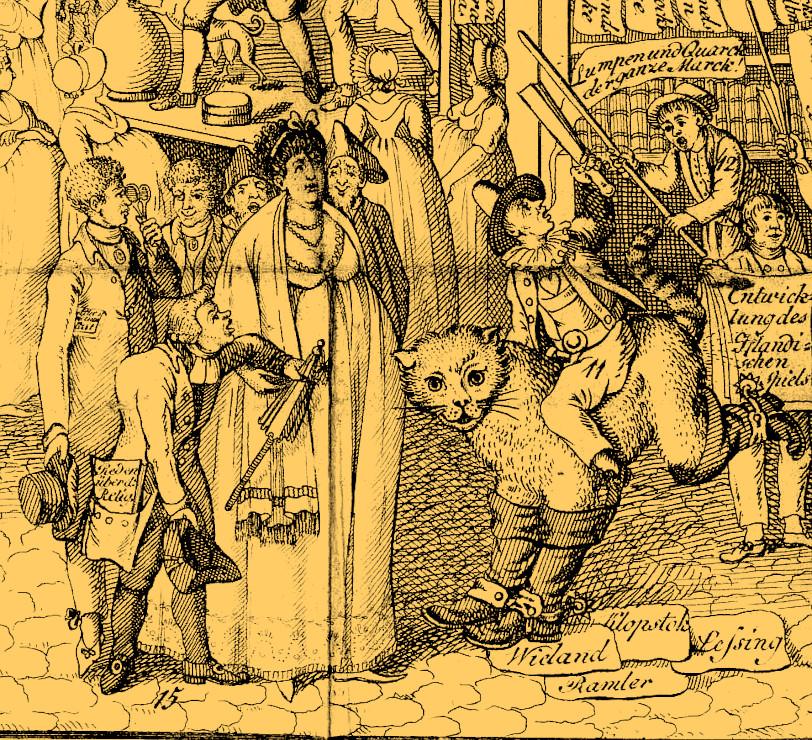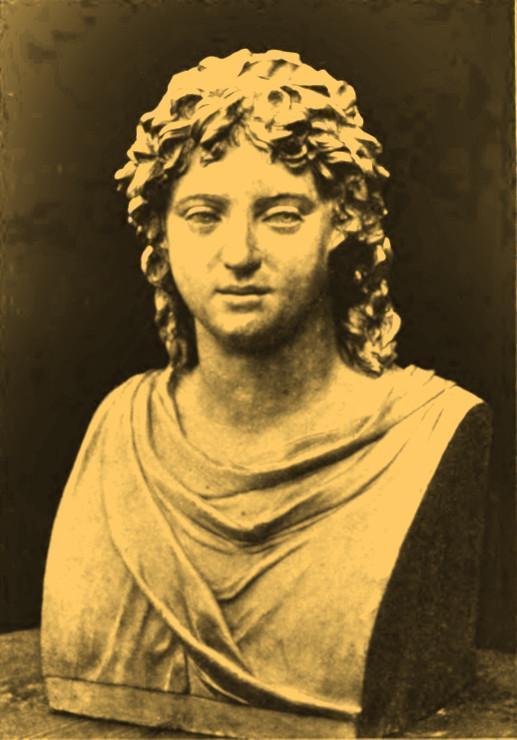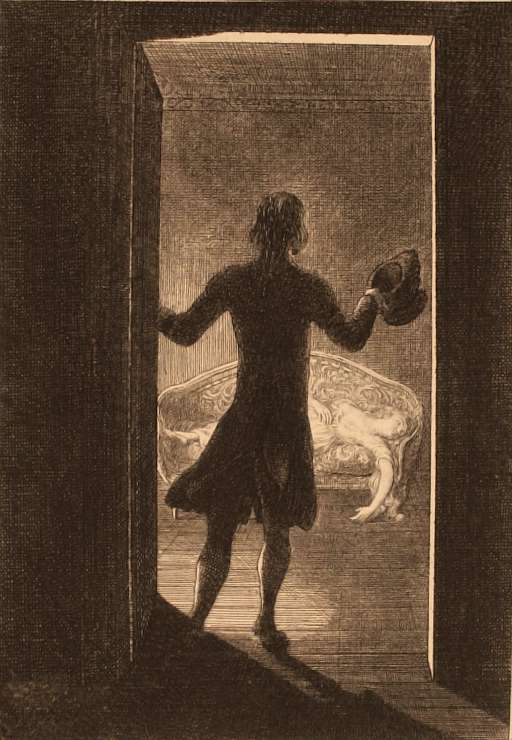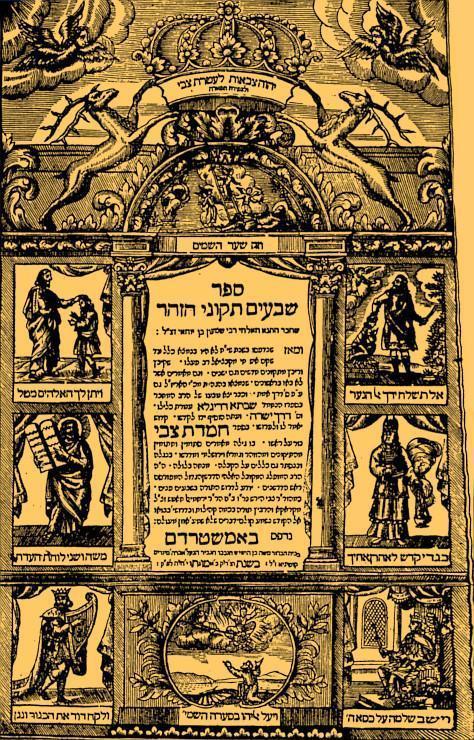274c. Dorothea Veit to Schleiermacher in Berlin: Jena, 17 November 1800 [*]
Jena, 17 November 1800
Perhaps only God himself knows what sort of printer’s politics makes a person wait two weeks for the final printer’s sheets! [1] But here it is finally, complete at last. I will very soon copy out for you the poem Friedrich did for my birthday, [2] but today I am not feeling entirely well, and am sitting here alongside my little Paulus, who is also not feeling well and is lying stretched out on the sofa; so I will not be doing much in the way of writing today, though Friedrich wrote you himself. [3]
I have seen nothing of Falk’s pocketbook-smut except the caricature engraving, the sight of which alone sufficiently warned me not to illuminate the printed material any further. [4] My God, who really, properly reads such things? Will you immediately take steps against this scoundrel? Probably not! I am annoyed only for Jette’s sake, and not even so much for her sake as because of the things she will have to hear about all this from Herz. [5]
Everyone around me just now, including Friedrich, is making such a racket that I cannot write a single sensible word. You can, however, look forward to me writing you again soon, and quite properly. But I must give you some requests now as well, from which neither God nor sermons can save you; specifically: for our dear Pauluses.
You will be all the more pleased to take care of these requests when I tell you that even I am hardly yearning to see you here more than does little Paulus. In fact, she recently dreamed you were here! Well, this dear little Paulus would very much like to eat Teltow turnips, and will give me no rest unless I get her some from Berlin, so please buy, or have one of your female acquaintances buy a bushel of such turnips, pack them in a container, and send them freight to my address, and I will send you cash for them immediately. [6] In so doing you will be making a splendid little lady quite obliged to you.
At the same time and with the same freight shipment, Jette’s bust could also be sent to me, for which I long. [7] And one more thing, could you possibly secure for me some Hebraic curio or other that I might give Paulus for Christmas? It can be quite modest and need not be expensive at all, the whole thing is merely meant as a joke, as you can easily imagine. [8]
I should write you something about Ritter? I cannot compare him with anything other than an electric fire machine with regard to which one admires solely the quiet artificiality and perceives nothing at first other than the clear water, and yet whoever understands how to operate it can produce a beautiful flame with the slightest pressure; [9] otherwise he is like the first letter in Lucinde, all mischief and devotion, and eating and praying all mixed together. [10] . . .
Notes
[*] Sources: Aus Schleiermacher’s Leben 3:241–42; Briefe von Dorothea Schlegel an Friedrich Schleiermacher 96–98; KGA V/4 319–22; KFSA 25:199–200. — Probably sent together with the letter Friedrich Schlegel wrote to Schleiermacher on ca. 17 November 1800 (letter 274b). Back.
[1] Of her novel Florentin, which would appear the following year (Leipzig 1801); she had already sent Schleiermacher the initial proofs she had receved (31 October 1800 [letter 273b]). Back.
[2] Concerning the poems at Dorothea’s birthday celebration, see her letter to Schleiermacher on 28 October 1800 (letter 273a), where she mentions two sonnets and a poem Friedrich had composed about a garland of violets Auguste had once woven for him. Concerning the sonnets, see note 18 there; for a translation of one, “Farbensinnbild,” see her letter to Schleiermacher on 31 October 1800 (letter 273b), note 5. Concerning the poem for Auguste, see the supplementary appendix “The Withered Garland”. Back.
[3] Illustration: Daniel Nikolaus Chodowiecki (1784); National Gallery of Art, Washington DC:

Otherwise the reference is presumably to Friedrich’s letter on the same day, letter 274b. — See below concerning Schleiermacher’s reaction to Karoline Paulus “lying stretched out on the sofa.” Back.
[4] Johann Daniel Falk’s Taschenbuch für Freunde des Scherzes und der Satire 5 (Leipzig 1801), an anti-Romantic periodical (see Caroline’s letter to Wilhelm Schlegel on 16 November 1801 [letter 330)], published a caricature of a grand trade show that also depicted Schleiermacher as a hunchback dwarf at the side of a pompous, amply endowed Henriette Herz.
The attendant farce focuses on a performance of Lucinde and includes Schleiermacher himself as a character (“a young cleric”) who praises and quotes from his own Über die Religion: Reden an die Gebildeten unter ihren Verächtern.
The issue also contains a review of Schleiermacher’s anonymous Vertraute Briefe über Friedrich Schlegels Lucinde zur richtigen Würdigung derselben (Lübeck, Leipzig 1800), also alluding to his authorship. Here at bottom left: Schleiermacher; a copy of his Über die Religion: Reden an die Gebildeten unter ihren Verächtern in his coat pocket; and Henriette Herz; Inhaltsverzeichnis deutscher Almanache, Theodor Springmann Stiftung):

Concerning the caricature, see the supplementary appendix on Daniel Jenisch’s Diogenes Laterne (supplementary appendix 252g.1), which suggested the motif Falk then incorporated into his own publication (see section 3 there), which includes a reproduction of the excerpt of the caricature and the full scene. The excerpt is reproduced in this letter’s annotations as well; see below. Back.
[5] In reality, Henriette Herz did not take the caricature that seriously, or did so only with the attitude of an urban resident accustomed to such things. She recalls this incident in her memoirs, though she does get the details of the caricature wrong (Henriette Herz. Ihr Leben und ihre Erinnerungen, ed. J. Fürst, 2nd ed. [Berlin 1858], 168–69; also Henriette Herz in Erinnerungen, Briefen und Zeugnissen, ed. Rainer Schmitz [Leipzig, Weimar 1984], 90–91):
It is quite understandable that people who spent as much time together as did Schleiermacher and I were also frequently observed together outside the house. And in that regard, indeed, the contrast between me, the very tall and, at the time, rather generously endowed woman, on the one hand, and the diminutive, gaunt, and not really handsomely formed Schleiermacher probably did have something comical about it.
And so it was that the purveyors of wit in Berlin had the presumption even to the point of publishing a caricature, a quite rare form of satirical expression here at the time. It portrayed me walking together with Schleiermacher, holding him in my hand as a Knicker, at the time a popular kind of small, collapsible parasol, while the same sort of Knicker, though very tiny, was also sticking out of one of his pockets. We were certainly not unaware of this caricature, yet I believe no one in Berlin laughed as heartily at it than did Schleiermacher and I, since the wit it expressed was actually of the rather inexpensive sort.
In the original caricature, Schleiermacher is holding the parasol, and what is peeking out of his pocket is a copy of his Über die Religion: Reden an die Gebildeten unter ihren Verächtern: Schleiermacher and Henriette Herz; to the right: Ludwig Tieck astride his “puss ‘n boots”:

[6] Teltow turnips, which rather than being round are instead long, like a carrot, were originally cultivated in the sandy soil of the town of Teltow, 15 km south of Berlin (Post Karte Durch ganz Deutschland, ed. J. Walch [Augsburg 1795]; illustrations: Theodor Lange, Allgemeines Gartenbuch: Praktische Anleitung usw., vol. 2, “Gemüsebau und Obstbau,” 2nd ed. [Leipzig 1897], 131; early-twentieth-century postcard advertisement for Dr. Oetker baking powder; recipe: Natalie Gotthard, Kochbuch für feine Küche [Berlin 1891], 226):



Ingredients: 1 liter Teltow Turnips 1–2 tablespoons of ground sugar [i.e., at the time: from a block]; Salt 3–4 tablespoons beef bouillonCaramelize the sugar in a casserole.
Peal and completely wash similarly sized Teltow turnips; mix them into the sugar while constantly tilting and pivoting the casserole.
Add the defatted beef bouillon.
Add a bit of salt and steam the turnips for 15 to 20 minutes over a medium fire.
Arrange them on a platter and serve fresh.
With a sharp, piquant, but not bitter taste, they were considered a delicacy, and Dorothea’s request here is certainly not without precedent, since Goethe had them shipped to him in Weimar by, among others, Karl Friedrich Zelter, and during the contemporaneous Napoleonic period these turnips became popular in French circles as well, where they were known as navets de Teltow. Back.
[7] Dorothea was apparently awaiting a copy (or the original?) of the bust by Johann Gottfried Schadow from ca. 1783 (dimensions 59cm x 38.5cm x 28cm) (illustration from Alexander Heilmeyer, Die Plastik seit Beginn des 19. Jahrhunderts [Leipzig 1907], plate 2):

[8] Heinrich Eberhard Gottlob Paulus was professor of ancient near eastern studies and languages in Jena. Schleiermacher responded from Berlin on 6 December 1800 (Aus Schleiermacher’s Leben 3:245 [this passage frag.]; KGA V/4 347; illustration: Daniel Nikolaus Chodowiecki, Almanach und Taschenbuch für Haeusliche und Gesellschaftliche Freuden auf das Jahr 1800; Inhaltsverzeichnis deutscher Almanache, Theodor Springmann Stiftung):
Then I also wanted to be able to relate some good news regarding your commissions, but waiting unfortunately did not help in that regard. I immediately despaired concerning the one. What on earth do you mean by “Hebraic curio”? A rare book? I really do not trust myself to find something of that sort here. One comes across something like that only by chance, never when one specifically searches for it, moreover anything one might find here would likely arrive too late for Paulus.
Because I was quite confident of finding the Teltow turnips, I was not a little surprised to have had no success at all in that venture. All my female acquaintances tell me that I am 6 weeks too late, that none can be had first-hand now and only inferior ones second-hand, i.e., from merchants, and quite expensive at that, and that shipping them, especially with a carter, is risky because they cannot tolerate even the slightest frost. That said, I intend to try with someone else tomorrow who has just returned from a trip, and see whether she is not more encouraging and has better sources, and can ensure care would be taken with the packing.
I will quite despair if I am wholly unable to be of service to little Paulus, of whom I have a decidedly saucy image stretched out on your sofa like that. Your also telling me that she dreamed about me is obviously a bit of malicious jesting on your part.

Concerning the “saucy image” and Dorothea’s “jesting,” see the supplementary appendix on Karoline Paulus’s interesting reputation.
See Dorothea Schlegel und deren Söhne, 1:107–8, regarding the poem Dorothea eventually gave to H. E. G. Paulus accompanying his gift that Christmas: “Instead of some ‘Hebraic curio’ . . . she gave him the book Zohar, the ‘”strange’ Chaldean [Aramaic] commentary to the Pentateuch,” with the accompanying poem (approximate prose translation; title page from Sefer šiv’im tikunej ha-Zohar [1706]):

On Sending the Book "Zohar"
How long was I so seriously resolved To send this book along with a jest! But nothing quite turned out right, And both wit and imagination seemed to flee. All that was gained was a waste of time; And yet will such deception not blind me longer, As if some kindly light might yet bequeath What my own head so long considered. Prophetic seriousness and solemn dignity, So they say, are my forte, Since light grace has otherwise remained afar. From the burden of this reproach myself to free, And since I did, indeed, catch the hint to exhibit, Thus was this sonnet composed through the favor of Art.
The Zohar is widely viewed as the major work in Jewish mysticism and as the most influential work of the Kabbalah. Its main section was composed as a hermeneutical commentary on the Pentateuch “using the Aramaic language in a creative manner, virtually inventing an original version of that language” (The Encyclopedia of Judaism, ed. Geoffrey Wigoder [New York, London 1989], 750). Back.
[9] See KGA V/4 322:
In his most recent experiments, Ritter had used the electricity of a voltaic pile to split water into hydrogen and oxygen, burning the gases in the process; Ritter had apparently also demonstrated these experiments — with which he became the founder of electrolysis — to Dorothea. Back.
[10] See Lucinde, here Friedrich Schlegel’s Lucinde and the Fragments, trans. Peter Firchow (Minneapolis 1971), 112: “In this letter everything is really mixed up, just as praying and eating, mischief and ecstasy are mixed up in life.” Back.
Translation © 2014 Doug Stott
